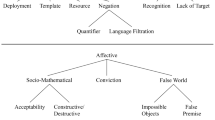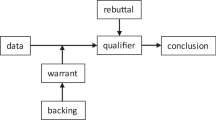Abstract
Professors in proof-based mathematics courses often intend that the feedback they provide on students’ flawed proofs will promote proof comprehension. In this theoretical article, we investigate how such feedback can be formulated. Drawing on Lakatos’s process of proof and refutation, we propose the notion of heuristic refutation feedback for feedback on a flawed proof that contains a mathematical argument, possibly incomplete, that logically implies that the student’s proof is invalid. Such feedback is heuristic in the sense that interpreting and utilizing it invites mathematical reasoning that can contribute to development of proof comprehension. We build on Toulmin’s model of argumentation to analyze possible variations in the formulation of feedback. Based on data from a Real-Analysis course, we highlight two key decisions entailed in formulating refutation feedback: deciding what flawed (possibly implicit) claim in the student’s proof to refute, and deciding how explicitly to present the various elements of the refutation argument. We exemplify these decisions in two particular types of refutation feedback that we have identified: refutation by counter-example and refutation by false implication. We show how different formulations of refutation feedback may afford different opportunities for student-engagement with particular facets of proof comprehension. Our findings suggest how professors can purposefully tailor feedback in order to achieve particular didactic goals.

Similar content being viewed by others
Data availability
The data that support the findings of this study are not publicly available due to privacy restrictions. Data are available from the corresponding author upon reasonable request and with the permission of the relevant participants of the study.
Notes
Both the extension and the refinement are demonstrated in Section 4.
References
Byrne, M., Hanusch, S., Moore, R. C., & Fukawa-Connelly, T. (2018). Student interpretations of written comments on graded proofs. International Journal of Research in Undergraduate Mathematics Education, 4(2), 228–253. https://doi.org/10.1007/s40753-017-0059-0
Conradie, J., & Frith, J. (2000). Comprehension tests in mathematics. Educational Studies in Mathematics, 42(3), 225–235. https://doi.org/10.1023/A:1017502919000
Cooper, J., & Pinto, A. (2017). Mathematical and pedagogical perspectives on warranting: Approximating the root of 18. For the Learning of Mathematics, 37(2), 8–13.
de Villiers, M. (2010). Experimentation and proof in mathematics. In G Hanna, H. N. Jahnke, & H. Pulte (Eds.), Explanation and proof in mathematics (pp. 205–221). Springer. https://doi.org/10.1007/978-1-4419-0576-5_14
Fukawa-Connelly, T. P. (2012). A case study of one instructor’s lecture-based teaching of proof in abstract algebra: Making sense of her pedagogical moves. Educational Studies in Mathematics, 81(3), 325–345. https://doi.org/10.1007/s10649-012-9407-9
Hattie, J., & Timperley, H. (2007). The power of feedback. Review of Educational Research, 77(1), 81–112. https://doi.org/10.3102/003465430298487
Hemmi, K. (2010). Three styles characterising mathematicians’ pedagogical perspectives on proof. Educational Studies in Mathematics, 75(3), 271–291. https://doi.org/10.1007/s10649-010-9256-3
Komatsu, K. (2016). A framework for proofs and refutations in school mathematics: Increasing content by deductive guessing. Educational Studies in Mathematics, 92(2), 147–162. https://doi.org/10.1007/s10649-015-9677-0
Komatsu, K., & Jones, K. (2019). Task design principles for heuristic refutation in dynamic geometry environments. International Journal of Science and Mathematics Education, 17(4), 801–824. https://doi.org/10.1007/s10763-018-9892-0
Komatsu, K., & Jones, K. (2021). Generating mathematical knowledge in the classroom through proof, refutation, and abductive reasoning. Educational Studies in Mathematics, 109(3), 567–591. https://doi.org/10.1007/s10649-021-10086-5
Lakatos, I. (1976). Proofs and refutations. Cambridge University Press.
Larsen, S., & Zandieh, M. (2008). Proofs and refutations in the undergraduate mathematics classroom. Educational Studies in Mathematics, 67(3), 205–216. https://doi.org/10.1007/s10649-007-9106-0
Mejía-Ramos, J. P., Fuller, E., Weber, K., Rhoads, K., & Samkoff, A. (2012). An assessment model for proof comprehension in undergraduate mathematics. Educational Studies in Mathematics, 79(1), 3–18. https://doi.org/10.1007/s10649-011-9349-7
Miller, D., Infante, N., & Weber, K. (2018). How mathematicians assign points to student proofs. The Journal of Mathematical Behavior, 49, 24–34. https://doi.org/10.1016/j.jmathb.2017.03.002
Moore, R. C. (2016). Mathematics professors’ evaluation of students’ proofs: A complex teaching practice. International Journal of Research in Undergraduate Mathematics Education, 2(2), 246–278. https://doi.org/10.1007/s40753-016-0029-y
Pinto, A., & Cooper, J. (2019). Formative assessment of proof comprehension in undergraduate mathematics: Affordances of iterative lecturer feedback. In U. T. Jankvist, M. van den Heuvel-Panhuizen, & M. Veldhuis (Eds.), Proceedings of the Eleventh Congress of the European Society for Research in Mathematics Education (pp. 2630–2637). Freudenthal Group & Freudenthal Institute, Utrecht University and ERME.
Pinto, A., & Karsenty, R. (2018). From course design to presentations of proofs: How mathematics professors attend to student independent proof reading. The Journal of Mathematical Behavior, 49, 129–144. https://doi.org/10.1016/j.jmathb.2017.11.008
Pinto, A., & Karsenty, R. (2020). Norms of proof in different pedagogical contexts. For the Learning of Mathematics, 40(1), 22–27.
Pinto A. (2019). Variability in the formal and informal content instructors convey in lectures. The Journal of Mathematical Behavior, 54. https://doi.org/10.1016/j.jmathb.2018.11.001
Rasmussen, C., Fredriksen, H., Howard, E., Pepin, B., & Rämö, J. (2021). Students’ in-class and out-of-class mathematical practices. In V. Durand-Guerrier, R. Hochmuth, E. Nardi, & C. Winsløw (Eds.), Research and development in university mathematics education (pp. 216–237). Routledge.
Reid, D. A. (2018). Abductive reasoning in mathematics education: Approaches to and theorisations of a complex idea. Eurasia Journal of Mathematics, Science and Technology Education, 14(9), https://doi.org/10.29333/ejmste/92552.
Rupnow, R., Hegg, M., Fukawa-Connelly, T., Johnson, E., & Weber, K. (2021). How mathematicians assign homework problems in abstract algebra courses. The Journal of Mathematical Behavior, 64, 100914. https://doi.org/10.1016/j.jmathb.2021.100914
Toulmin, S. E. (1958). The uses of argument. Cambridge University Press.
Weber, K. (2012). Mathematicians’ perspectives on their pedagogical practice with respect to proof. International Journal of Mathematical Education in Science and Technology, 43(4), 463–482. https://doi.org/10.1080/0020739X.2011.622803
Woods, C., & Weber, K. (2020). The relationship between mathematicians’ pedagogical goals, orientations, and common teaching practices in advanced mathematics. The Journal of Mathematical Behavior, 59. https://doi.org/10.1016/j.jmathb.2020.100792
Yang, K.-L., & Lin, F.-L. (2008). A model of reading comprehension of geometry proof. Educational Studies in Mathematics, 67, 59–76. https://doi.org/10.1007/s10649-007-9080-6
Author information
Authors and Affiliations
Corresponding author
Ethics declarations
Conflict of interest
The authors declare no competing interests.
Additional information
Publisher's note
Springer Nature remains neutral with regard to jurisdictional claims in published maps and institutional affiliations.
Supplementary Information
Below is the link to the electronic supplementary material.
Rights and permissions
Springer Nature or its licensor holds exclusive rights to this article under a publishing agreement with the author(s) or other rightsholder(s); author self-archiving of the accepted manuscript version of this article is solely governed by the terms of such publishing agreement and applicable law.
About this article
Cite this article
Pinto, A., Cooper, J. “This cannot be”—refutation feedback and its potential affordances for proof comprehension. Educ Stud Math 113, 287–306 (2023). https://doi.org/10.1007/s10649-022-10190-0
Accepted:
Published:
Issue Date:
DOI: https://doi.org/10.1007/s10649-022-10190-0




